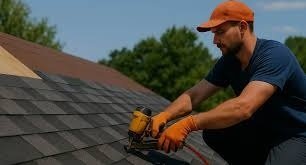Your roof is your home's first line of defense against the elements—especially in Fort Worth, where scorching summers, intense hailstorms, and heavy rains put roofing systems to the test. Without regular maintenance, even minor roof damage can evolve into expensive repairs. Routine roof inspections are essential to ensure your home stays protected year-round.
This guide outlines everything Fort Worth homeowners need to know about roof inspections—when to schedule them, what to expect, and why they’re a smart investment for long-term home protection.
Why Roof Inspections Matter
Many homeowners overlook regular roof inspections, but these checkups can prevent costly repairs and extend the life of your roof. Here’s why scheduling inspections is essential:
Early Detection of Problems
Small issues—like cracked shingles or deteriorating flashing—can quickly escalate into leaks or structural problems if ignored. Regular inspections help identify and resolve these concerns before they worsen.
Maximize Roof Lifespan
Proactive maintenance ensures your roof reaches its full service life. Identifying wear early can reduce the need for premature replacement and stretch your investment.
Weather Readiness
Fort Worth’s extreme weather—100°F+ heat, hail, and strong winds—can severely impact your roof. Routine inspections prepare your home for seasonal weather and catch storm-related damage early.
Insurance Claims Documentation
If a storm or hail causes roof damage, having documentation from prior inspections strengthens your insurance claim and may speed up reimbursement.
How Often Should You Inspect Your Roof?
Roof inspections should be performed at least twice a year, plus after major storms or severe weather. Here are key times to schedule one:
- Spring and Fall: These seasons are ideal for assessing damage from extreme summer heat or any lingering winter impacts.
- After Severe Weather Events: Strong winds or hail can dislodge or crack shingles. Inspect your roof after storms to spot any visible damage.
- When Buying or Selling a Home: A certified roof inspection provides clarity about the home’s condition and can aid in negotiations.
DIY Roof Inspections vs. Hiring a Professional
When to Go DIY
If you're confident using a ladder and understand basic roofing components, you can conduct a simple visual inspection on your own. Look for:
- Missing, cracked, or curling shingles
- Damaged flashing around chimneys and vents
- Discoloration, moss, or algae buildup
- Debris accumulation or sagging areas
**Exercise caution—**steep or high-pitched roofs pose safety risks, and subtle issues are often easy to overlook without the right tools.
When to Call a Pro
For a more thorough, safe inspection, hire a licensed roofing contractor. A professional will:
- Use thermal imaging and moisture detection tools to find hidden damage
- Evaluate flashing, insulation, attic ventilation, and overall structure
- Provide a written assessment with repair recommendations and cost estimates
What to Expect During a Professional Roof Inspection
Professional roof inspections are typically broken down into three core stages:
1. Exterior Inspection
The contractor assesses shingles, flashing, chimneys, skylights, vents, and gutters for signs of wear, structural weakness, and storm damage.
2. Interior Inspection
Inside your attic, they’ll check for water stains, leaks, insulation problems, and ventilation issues that could compromise your roof’s performance.
3. Assessment Report
You’ll receive a detailed report outlining current roof conditions, any damage found, recommended repairs, and estimated costs.
Best Roofing Materials for Fort Worth Homes
Choosing the right materials for repairs or replacements is critical in Fort Worth’s weather-heavy environment. Here are some of the most effective roofing materials for local homes:
Asphalt Shingles
- Pros: Affordable, easy to install, and widely available
- Lifespan: 20–30 years
- Best For: Budget-conscious homeowners seeking reliability
Metal Roofing
- Pros: Reflects sunlight, resists hail, and lasts decades
- Lifespan: 40–70 years
- Best For: Energy efficiency and storm protection
Clay Tiles
- Pros: Fire-resistant, heat-diffusing, and architecturally stylish
- Lifespan: 50–100 years
- Best For: Mediterranean or Spanish-style homes
Flat Roof Systems
- Pros: Easy to maintain and perfect for solar panel setups
- Lifespan: 20–25 years
- Best For: Modern homes with flat or low-slope roofs
Roof Inspection Costs & What Affects Them
Roof inspection pricing varies based on size, material, and access. Here’s a general range:
- Basic Visual Inspection: $100–$300
- Comprehensive Inspection (includes thermal or drone imaging): $300–$600
Cost Factors Include:
- Roof size and slope
- Height and accessibility
- Material type (tile, metal, shingles)
- Inspection depth (basic vs. specialized)
Tips to Maintain Your Roof Year-Round
Consistent care between inspections can significantly increase your roof’s durability and reduce the risk of sudden repairs.
- Clean Your Gutters: Clogged gutters trap water that can seep into roofing materials. Clear them regularly, especially in fall.
- Trim Overhanging Branches: Branches may break during storms and damage shingles or puncture the roof surface.
- Monitor for Mold or Algae: Growth can deteriorate materials. Clean affected areas with safe roof-cleaning solutions.
- Perform Small Repairs Promptly: Replace missing shingles or seal exposed flashing before small issues become expensive ones.
How to Choose the Right Roofing Contractor in Fort Worth
If an inspection reveals the need for repairs or replacement, finding the right contractor is key. Here's what to look for:
- Local Experience: Contractors who work in Fort Worth understand the region’s weather patterns and building codes.
- Credentials: Confirm they’re licensed, insured, and have verifiable customer reviews or ratings.
- Warranties: Trustworthy contractors back their work with warranties on labor and materials.
Invest in Your Roof, Protect Your Home
Your roof isn’t just an architectural feature; it’s your home’s armor against Fort Worth’s unpredictable weather. Regular roof inspections and proactive maintenance can save you thousands in repairs, extend your roof’s lifespan, and keep your home safe and comfortable.
Prioritize your home’s protection before the next storm hits. Schedule a certified roof inspection today with a trusted local contractor to safeguard your investment and prevent future issues.
Business Name: Veteran Brothers Roofing & Restoration
Address: 5310 N Tarrant Pkwy #128, Fort Worth, TX 76137
Phone number: (817) 415-0067
 Online Clock
Online Clock